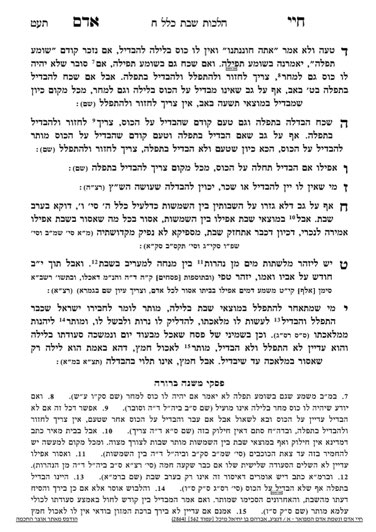We are beginning siman 9. There is a Gemara which says that during bain hashmashos of Shabbos, a person should not drink water from the river. There are different opinions regarding whether the Gemara is referring to bain Hashmashos on Friday Night, Motzei Shabbos, or both. Although this halacha is not so practical nowadays, since we generally do not drink from rivers, there are many opinions which hold this Gemara applies to all water, and that from sunset until tzais hakochavim, one should not drink any water at all. There are many who are makpid on this halacha; however, it appears that nowadays many are not aware of this halacha, and rely on the opinions that it only applies to water drawn from a river. That being said, one should try to refrain from taking water from a tap during bain hashmashos, as tap water, which generally comes from a reservoir, may have the equivalent halachic status of a river. The halachos regarding eating and drinking during bain hashmashos, such as making kiddush before drinking on Friday Night or beginning seudah shlishis before shkia on Shabbos day, do not create any leniencies in this halacha.
In siman 10, the Chayei Adam writes that one who has pushed off davening maariv on motzai Shabbos past the zman of Shabbos can instruct another Jew, who has already davened maariv and recited a havdalah, to perform melacha for them. In other words, once Shabbos is over, amira l’yisroel is muttar. The Jew who is still keeping Shabbos can instruct the Jew who has already ended Shabbos to light candles, cook, and do other melachos, and he can benefit from those melachos while he is still keeping Shabbos. Thus, for example, if the Jew who is still keeping Shabbos is in the middle of seudah shlishis, he can ask the Jew who has already ended Shabbos to turn on lights or cook food for his seudah shlishis!
The Piskei Mishnah Berurah points out that there are opinions that although the Jew who is keeping Shabbos can instruct the other Jew, he cannot benefit from the melacha performed. However, we pasken like the first opinion. In other words, we look at the end of Shabbos as clearly no longer Shabbos; at the same time, Chazal prohibit a person from performing melacha until they perform havdalah. Therefore, inasmuch as one person has not yet performed havdalah, there is no issue with them instructing or benefitting from the melacha of another.
Similarly, the Chayei Adam writes that if one begins a meal at the end of the eighth day of Pesach, and it extends past the end of Yom Tov, although they may not perform melacha until they perform a havdalah, they may eat chametz. To be clear, one may want to be careful with their pesach dishes, but in terms of the issurei chametz, since it is after nighttime, chametz is now muttar.
The Mishnah Berurah points out that one would no longer be able to recite yaaleh veyavo in birchas hamazon if they were to eat chametz at this meal, because it is a tarti desasri (contradiction) to state that it is Pesach while eating chametz. If one would be able to find someone to be motzi them in yaaleh veyavo, they would be able to eat chametz at this seudah. Although this scenario is not so practical, it helps bring out this point that once it is nighttime, the issurim of Shabbos/Yom Tov are no longer in force, but there is a separate issur derabanan to perform melacha until one performs havdalah.
Summary
- One should refrain from drinking water from the river, and, by extension, drawing water from the tap and drinking it, during bain hashmashos. Although many are no longer careful about this halacha it is appropriate to still follow it.
- Once the zman of Shabbos has passed (tzeis hakochavim and tosefes), one may benefit and even instruct another Jew who has ended Shabbos to perform melacha, even if the first Jew has not yet performed havdalah. The issurim of Shabbos and the chiyuv to perform havdalah are separate from one another; once Shabbos is over, the issurim of Shabbos have ended, but a person is not allowed to perform melacha until they personally perform havdalah.



